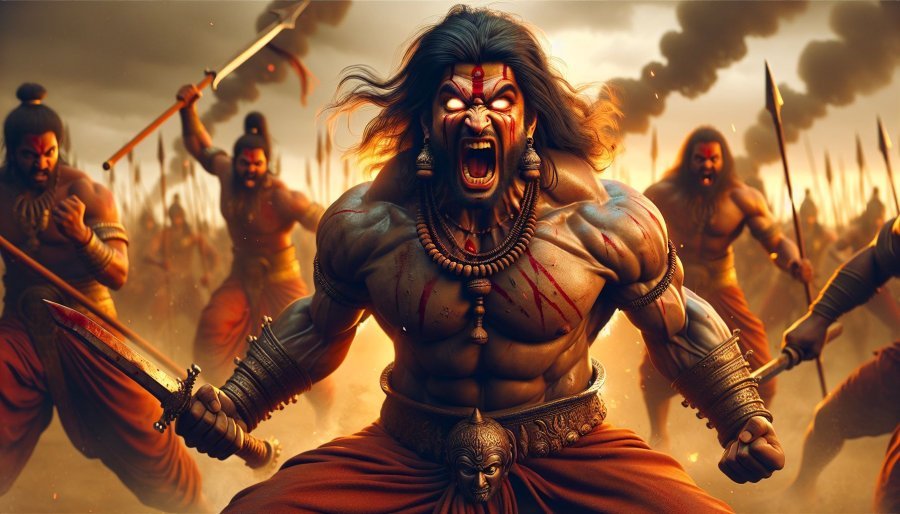Section LXXI - Draupadi's Insult: Bhima's Wrath and Arjuna's Wisdom
Book index: Mahabharata (English)
This page contains a summary of the Mahabharata Section LXXI including examples of moral lessons in daily life. The Maha-Bharata is one of the largest epics ever written containing roughly 100,000 Sanskrit verses. It deals with the legendary history of ancient India and contains a large number of interwoven tales.

Short summary of the chapter:
After Draupadi was insulted in the Kuru court, Karna praised her for being the salvation of the Pandavas in their time of distress. Bhima, angered by the insult to his wife, lamented that their family's light had been dimmed by this incident and questioned how a son born from such humiliation could be of any service to them. Arjuna advised that noble individuals do not dwell on the harsh words of their enemies but instead remember their good deeds.
Bhima, fueled by rage, proposed immediate retaliation against their enemies, eager to slay them all and take control of the entire earth without any rivals. Arjuna, the voice of reason, urged his brother to show restraint and tried to calm him down with peaceful gestures. Despite this, Bhima's anger continued to grow until his very appearance became terrifying, with flames of wrath seeming to emanate from him.
Yudhishthira, the eldest Pandava, intervened and embraced Bhima, urging him to remain calm and peaceful. The king then approached their uncle Dhritarashtra, joining his hands in entreaty, seeking a resolution to the conflict. The scene was filled with tension as Bhima's fiery wrath and desire for revenge clashed with Arjuna's attempts to promote peace and restraint within the family.
The situation in the Kuru court remained precarious, with the Pandavas at odds over how to respond to Draupadi's humiliation and the insults they had endured. Bhima's fiery rage threatened to consume everything in its path, while Arjuna sought to find a more peaceful and diplomatic solution to the conflict. Yudhishthira, as the voice of reason, tried to navigate a path that would lead to justice without unnecessary bloodshed, all while dealing with the anger and resentment that simmered among the Pandavas.
Despite the intense emotions and conflicting desires within the Pandava camp, Yudhishthira's calm and diplomatic approach eventually prevailed, leading to a resolution that would shape the course of the Kurukshetra war. The insult to Draupadi served as a catalyst for the events that followed, setting in motion a chain of events that would ultimately lead to the great battle between the Pandavas and the Kauravas. Through a combination of wisdom, restraint, and bravery, the Pandavas would navigate the challenges ahead and strive to restore their honor and rightful place in the world.
Full English translation:
This page is merely a summary which is automatically generated. If you are looking for authentic sources such as the Sanskrit text or the Full English translation of Mahabharata Section LXXI - Draupadi's Insult: Bhima's Wrath and Arjuna's Wisdom, have a look at the following articles:
Section LXXI, online text
English translation by Kisari Mohan Ganguli.
Read this and other chapters online.
Mahabharata (English Summary)
by Kisari Mohan Ganguli | ISBN-10: 8121505933
Buy the latest edition:
FAQ of Mahabharata, Section LXXI:
Why was Draupadi considered as a salvation to the sons of Pandu?
Draupadi's act of courage and loyalty during the time of distress saved the Pandavas.
How did Bhima react to the insult of Draupadi?
Bhima wanted to retaliate immediately, but Arjuna pacified him.
How did Yudhishthira handle the situation after Bhima's anger?
Yudhishthira calmed Bhima down and approached Dhritarashtra with entreaty.
Daily life: Draupadi's Insult: Bhima's Wrath and Arjuna's Wisdom:
The story above, drawn from the epic Mahabharata, illustrates the importance of patience, forgiveness, and control over one's emotions in the face of insult or provocation. In today's life, just like Arjuna, it is essential to remember that responding to harsh or provocative words with grace and not reacting impulsively can be a sign of strength and respect for oneself. When faced with difficult or aggravating situations, it's worthwhile to consider the bigger picture and not let anger dictate our actions, just as Arjuna advised Bhima to not focus on retaliation but to remember the good deeds instead.
Similarly, Yudhishthira's act of calming Bhima down and seeking a peaceful resolution underscores the value of seeking harmony and not letting anger escalate conflicts. It teaches the lesson that sometimes, embracing peace and maintaining silence can be more powerful than engaging in conflict. Just as the characters in the story sought to protect their dignity and values without resorting to violence, in real life, preserving relationships and fostering understanding can often lead to more constructive outcomes than confrontations.
Applying this wisdom in daily life implies actively choosing to not let negative emotions control our actions. It encourages practicing empathy, understanding, and patience even when it's challenging. This story serves as a reminder that our responses to adverse situations define our character and the quality of our interactions with others.
